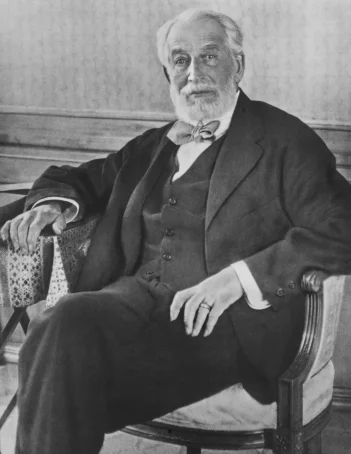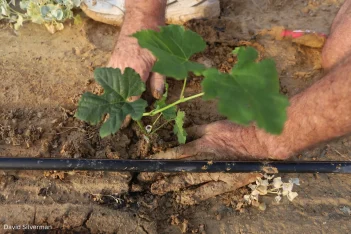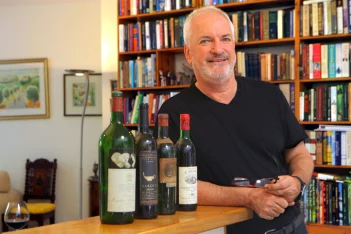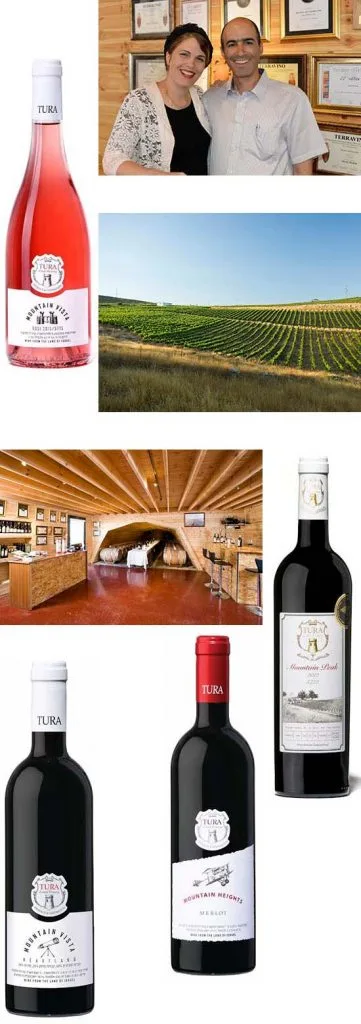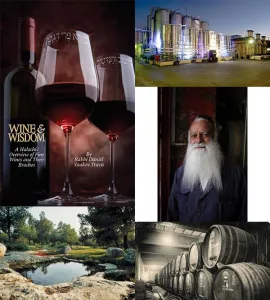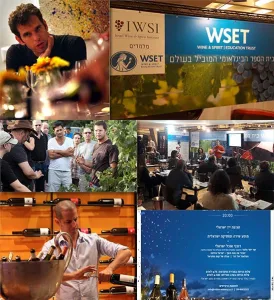“If we stop here, they will kill us.” So said Vered Ben Sa’adon, as we passed through the last Arab village, before arriving at the Har Bracha vineyard, just south of Nablus. An alarming prospect for someone not used to travelling these roads. At that moment, I felt more like a stiff whisky than a glass of wine.
We arrived at the high altitude vineyard at 850 meters above sea level. It was sparse, stony, and slightly bleak. The expanse of green vineyards was familiar and strangely comforting. There was a feeling of Biblical Israel. It was also quiet. An absolute silence. The only activity, was the of evangelist families who had arrived that morning from America and were already building huts and preparing containers for a period of work and contemplation in the Holy Land.
Har Bracha was a name I knew in a wine context from the early 2000’s. When Carmel Winery began its own mini quality revolution, it released a series of single vineyard wines. One of which was the much praised Har Bracha Merlot 2002. Of course, at the time I worked for Carmel. Now this was a mighty Merlot, one that really wanted to be a Cabernet. It was a tannic, big wine that needed a few years to soften. Even the last time I tasted it, it was still showing its personality.
The name Har Bracha proved too toxic for marketing to the general world and it was dropped, but this one time flash of lightening was enough to encourage the local growers to develop their vineyards.
The people who had sold their precious fruit to Carmel were Erez and Vered Ben Sa’adon. They first planted vines in 1997. On the strength of this success, they expanded their vineyards. Erez studied wine at Tel Hai College and at Ariel and they founded the Erez Winery in 2003. Later the name was later changed to Tura. The winery is situated in Rehelim, which is east of Ariel. There, they have built an attractive and original visitors center with a long tasting table, which just invites you to sit down and have a shluk of wine.
Erez is a grower type, probably happier to be amongst his vines than with people. He is the thinker and stategist who has the drive to implement his dreams. Vered is vivacious, feisty, talkative and enthusiastic. Vered describes it best; She said Erez ‘does’ and she ‘talks’! In fact they are a great team, one complimenting the other.
Vered has a fascinating background. She was born in Holland to a Jewish father and non-Jewish mother. Her grandmother on her mother’s side was engaged to a member of the Gestapo. Anyway to cut a long story short, in the funny way these things happen, the mother eventually came to Israel, converted and her three year old girl was brought up as an orthodox Jewess.
The Ben Sa’adons are growers who also sell their grapes to a number of wineries in Israel, though many will not admit where the grapes come from. They have flirted with all sorts of agriculture including producing honey and olive oil. They also produced a great cider, but now sell their apples on, wanting to concentrate on wine.
Different areas are becoming known in Israel for different varieties. It is unwise to generalize, but maybe the Upper Galilee is Cabernet land. The northern Golan Heights produces the freshest white wines. The Mt Carmel region is best for Carignan, whilst the Judean Hills is excellent for Chardonnay, Syrah and Petite Sirah. In the same vein, it is possible to say that the Samarian Mountains are known for producing some of the finest Merlot in the country. The Tura and Shiloh Merlots are regular prize winners.
Samaria is the northern part of the West Back, otherwise known as ‘The Territories’, or ‘Yehuda and Shomron’. I prefer to describe the region as the Central Mountains which is a non-political way to describe the topography. In fact the same mountain range runs down the spine of the country from Har Bracha or Mount Grizim to Hebron.
Of course mention the word ‘Samaria’ and certain people the world over, termed by some as ‘leftists’, will not touch the wines because they come from Occupied Territory. Even in Tel Aviv the debate is no less vociferous. Many restaurants will not list wines from there.
However, you need not worry for the well-being of the Central Mountain wineries. There are more than enough Jewish communities worldwide, and in Israel too, that may be termed by others as ‘right wing’, who practice reverse discrimination and buy the wine precisely because they come from there. Of course when used in this way, the words ‘right wing’ or ‘leftist’ are pejorative terms, used to convey a feeling of utter disgust by the ‘other’ side of the political equation. Everything is political in Israel, including wine it seems!
Tura is a proud winery first and foremost, but they also consider themselves as ambassadors for the region. Vered Ben Sa’adon is a determined advocate of wines from Central Mountains and is not afraid to call out those, whether journalists, restaurateurs or members of the public, who give their wines a miss. She is almost missionary in her determination to advance the region. Just to reemphasize the point, the words: ‘Wine from the Land of Israel’ is written on every label.
I visited as a wine guy interested in the development of a new wine region in Israel in the exact place where Biblical Israel flourished. A viable wine route has been created with a number of successful wineries and young vineyards planted along the way. The wines are good and getting better. The passion of the farmers and wine growers is immense. To work in wine requires passion. To work the land as pioneers is one sort of passion. To settle the land of Biblical Israel as religious Jews, requires another sort of passion. Together, this is a triple dose. These wine pioneers are not shrinking violets, but they are recreating a wine trade to mimic their forefathers of ancient times.
My own view is that I don’t believe in boycotts, because you either have to boycott everything or nothing. You can’t credibly be a boycotter on one issue only without exhibiting prejudice. On the other hand I believe every restaurant or customer has the right to buy what they want and every journalist has the right to write about which wines they want. It is a free world. I believe in ‘Live & Let live.’ As far as it goes with critics and customers, you win some and lose some. That is the way of the world. Anyway, in my opinion, no Israeli winery suffers lasting damage from boycotts from anywhere. Furthermore, most Israel wine is sold in places where the effect of BDS is zilch. Where there is bad publicity, contrary to the wishes of the boycotters, it normally works to the advantage of the winery or region.
Tura Winery is arguably the most visual representative of the northern Central Mountains. They have three labels. Mountain Vista is their entry level label for bright, up front wines. Mountain Heights is their reserve label and Mountain Peak, their flagship wine. They regularly win awards in both Israeli and international competitions. They use the services of Itai Lahat one of Israel’s best winemaking consultants, which underlines their ambition and professionalism. They have a winery slogan ‘Patience & Inspiration’. I think it is a mistake. It should read: Patience, Inspiration and Passion.
TURA MOUNTAIN VISTA ROSE 2015
Nicely colored pink rose made from Merlot and Cabernet Franc grapes. It is fruity with a touch of sweetness but nonetheless, is very refreshing. Price: 90 ILS
TURA MOUNTAIN VISTA GEWURZTRAMINER 2015.
This will be popular. Fruity with floral notes, with a pleasing sweetness. Price: 90 ILS
TURA MOUNTAIN VISTA HEARTLAND 2014
A blend of Cabernet Sauvignon 67% and Merlot 33%, aged for 12 months in French oak barrels. The wine is rich, spicy and the oak is apparent but in balance. Price: 129 ILS
TURA MOUNTAIN HEIGHTS MERLOT 2013
Rounded, full bodied red with warm berry fruit and plum, with more than a touch of vanilla. The wine is oaky, has soft tannins and good acidity. Long finish. Price: 129 ILS
TURA MOUNTAIN PEAK 2013
This the prestige wine of the winery. It is a Bordeaux style blend of Cabernet Sauvignon, Merlot, Petit Verdot and Cabernet Franc. The wine was aged for 22 months in oak. The result is a full bodied wine with aromas of black currant and blackberry with black cherry, a dominant oak presence which coats the mouth and a long balanced finish. Price 200 ILS












